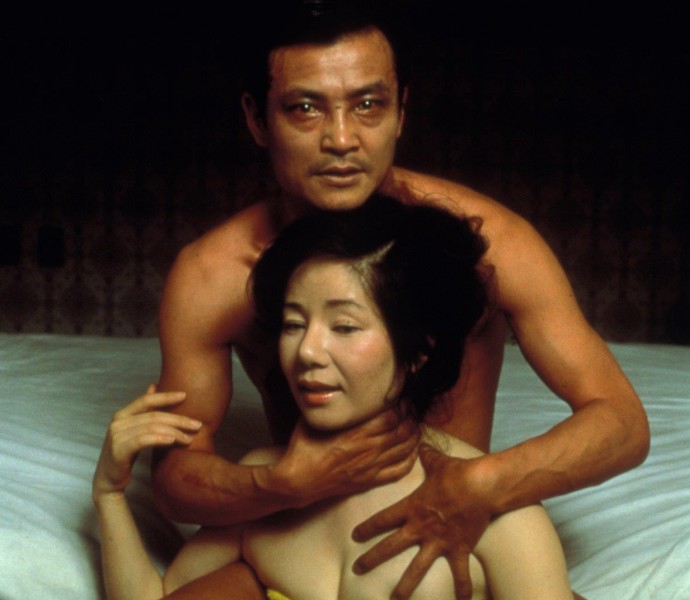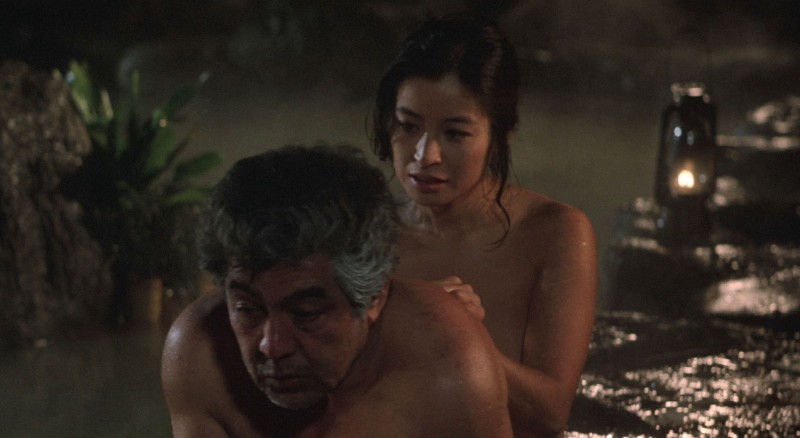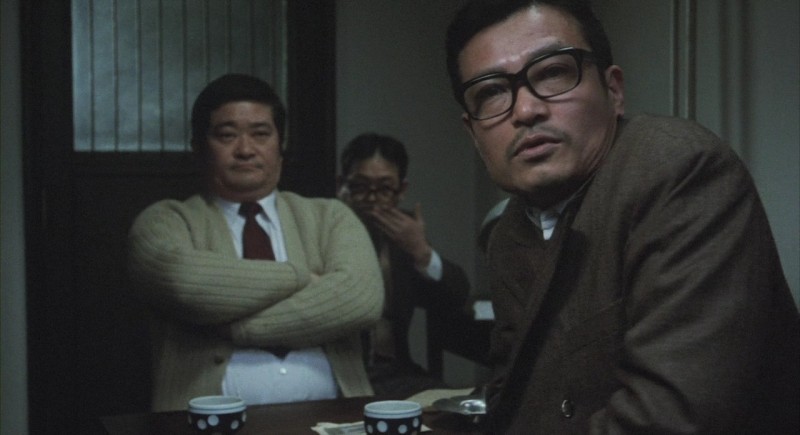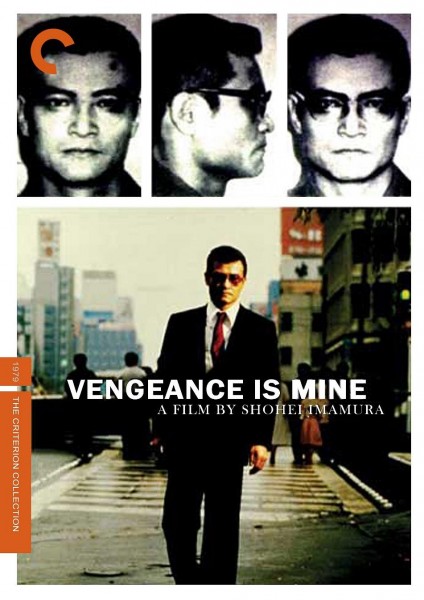Vengeance is Mine: Criterion Review
"Shohei Imamura's 'Vengeance is Mine' is a brutal, yet tantalizing piece of filmmaking"
Featured in this week's
DISCussion, we have decided to review the Criterion Edition of Shohei Imamura's
Vengeance is Mine.
Twisted and dark, Shohei Imamura's
Vengeance is Mine is the candid portrait of a Japanese serial killer's rampage, and is every bit as cold-blooded as its anti-hero.

Based on the book of the same name, which is itself based in reality,
Vengeance is Mine is the story of Iwao Enokizu's (Ken Ogata) life and the 78 days he spent on the run from police. Told in the first-person through flashbacks, Imamura dives into the sociopath's psyche, and attempts to honestly portray the man as he was. The film opens with Enokizu already in police custody, and the flashbacks are presented as either Enokizu's own confessions or as witness testimony.
Early in his life, Enokizu observes his father being dishonored, and decides that his father is not worthy of respect. He continues to rebel against his family by marrying outside of his father's Catholicism. Finding himself in jail for fraud, Enokizu's wife leaves him, and moves away with their two children. After his release, he finds that his father has enlisted the help of ex ex-wife at his hotel, and the two have become transfixed on each other; this marks the beginning of Enokizu's murderous rampage.

Shohei Imamura's graphic and honest portrayal of Enokizu's heinous crimes, coupled with his acute storytelling ability, bring this story to life. What begins as a tangle of several mixed story lines, eventually untangles, and becomes singular and cohesive. Just as a police investigation, we are only presented with the facts as they become available, and must piece-together all of the incredible details. As the various witness testimonies merge into Enokizu's own confession, the vastness of his many crimes, and the more seedy faction of Japanese society come to light.
As a womanizer and sexual deviant, Enokizu relies heavily upon the service of prostitutes and the hotels in which they operate. In depicting these many seedy interactions, Imamura is able to showcase the hidden underbelly of Japanese culture. Enokizu gambles, commits innumerable frauds and depends on the trust of others in order to satiate his expensive habits. The more desperate Enokizu becomes, the greater his will to survive becomes. Almost to the point of becoming farcical, Imamura's representation of the publicly mild-mannered Enokizu juxtaposed with the raw intensity of private, homicidal Iwao, show exactly why it was so challenging to put this madman behind bars. Enokizu's uniquely charismatic power to blend in and play on people's emotions served as the perfect social camouflage.

While most of this film's acting is well above par, Ken Ogata's characterization of the relentless Enokizu is absolutely sublime. Just as magnetic as the character he portrays, Ogata elevates the antihero to new, unimaginable heights. Showing the perfect mixture of confidence and paranoia, Ogata captures the raw, affectlessness of his title character. Bizarrely generous, unassumingly charming, deceptively vengeful, Ogata's Enokizu makes the audience hate him, while at the same time becoming wholly enthralled by him. The casual nature with which Ogata handles his character's crimes sends chills down your spine, as his cold indifference to the tragedy seems unthinkable. Totally chaotic inside his own head, Ogata plays Enokizu as coldly-unflinching on the surface. Only when he is struck with the desire to kill is Enokizu ever overcome with rage, yet, once the deed is done, he returns to his serene demeanor. Utterly unhinged, yet ostensibly put-together, Ogata's Enokizu is a paradox that perfectly reflects the film's equally inexplicable mood.
Entirely melancholic and deeply introspective,
Vengeance is Mine is a complex and chilling look into the mind of a mad man.

The Criterion edition of this film comes in the standard clear case, with a beautiful new cover designed by Eric Skillman. The extra features on this edition are relatively bare-bones for a Criterion release, but there is still a commentary track with film critic Tony Rayans, an interview with the director, and the teaser and full length trailers. The commentary seems helpful in spotting subtleties and nuance in the production that the casual observer may have overlooked. Rayans also goes in-depth about the story's factual background, and dives into a myriad of topics surrounding the film and filmmaking in general.
The interview with Imamura offers little added information about the film, or his lead character's motivations. He does, however discuss the process of adapting the book into a film, as well as casting and his thoughts on the final project.
The booklet included with the Blu-ray has three writings,
an essay by critic Michael Atkinson, a 1994 interview with Imamura by filmmaker Toichi Nakata, and writings Imamura did on the making of the film and on his style of directing.
Pros
- Incredible Directing
- Mesmerizingly-Cold Acting by Ken Ogata
Cons
- The Criterion Edition Lacks the Usual Amount of Special Features
 Based on the book of the same name, which is itself based in reality, Vengeance is Mine is the story of Iwao Enokizu's (Ken Ogata) life and the 78 days he spent on the run from police. Told in the first-person through flashbacks, Imamura dives into the sociopath's psyche, and attempts to honestly portray the man as he was. The film opens with Enokizu already in police custody, and the flashbacks are presented as either Enokizu's own confessions or as witness testimony.
Early in his life, Enokizu observes his father being dishonored, and decides that his father is not worthy of respect. He continues to rebel against his family by marrying outside of his father's Catholicism. Finding himself in jail for fraud, Enokizu's wife leaves him, and moves away with their two children. After his release, he finds that his father has enlisted the help of ex ex-wife at his hotel, and the two have become transfixed on each other; this marks the beginning of Enokizu's murderous rampage.
Based on the book of the same name, which is itself based in reality, Vengeance is Mine is the story of Iwao Enokizu's (Ken Ogata) life and the 78 days he spent on the run from police. Told in the first-person through flashbacks, Imamura dives into the sociopath's psyche, and attempts to honestly portray the man as he was. The film opens with Enokizu already in police custody, and the flashbacks are presented as either Enokizu's own confessions or as witness testimony.
Early in his life, Enokizu observes his father being dishonored, and decides that his father is not worthy of respect. He continues to rebel against his family by marrying outside of his father's Catholicism. Finding himself in jail for fraud, Enokizu's wife leaves him, and moves away with their two children. After his release, he finds that his father has enlisted the help of ex ex-wife at his hotel, and the two have become transfixed on each other; this marks the beginning of Enokizu's murderous rampage.
 Shohei Imamura's graphic and honest portrayal of Enokizu's heinous crimes, coupled with his acute storytelling ability, bring this story to life. What begins as a tangle of several mixed story lines, eventually untangles, and becomes singular and cohesive. Just as a police investigation, we are only presented with the facts as they become available, and must piece-together all of the incredible details. As the various witness testimonies merge into Enokizu's own confession, the vastness of his many crimes, and the more seedy faction of Japanese society come to light.
As a womanizer and sexual deviant, Enokizu relies heavily upon the service of prostitutes and the hotels in which they operate. In depicting these many seedy interactions, Imamura is able to showcase the hidden underbelly of Japanese culture. Enokizu gambles, commits innumerable frauds and depends on the trust of others in order to satiate his expensive habits. The more desperate Enokizu becomes, the greater his will to survive becomes. Almost to the point of becoming farcical, Imamura's representation of the publicly mild-mannered Enokizu juxtaposed with the raw intensity of private, homicidal Iwao, show exactly why it was so challenging to put this madman behind bars. Enokizu's uniquely charismatic power to blend in and play on people's emotions served as the perfect social camouflage.
Shohei Imamura's graphic and honest portrayal of Enokizu's heinous crimes, coupled with his acute storytelling ability, bring this story to life. What begins as a tangle of several mixed story lines, eventually untangles, and becomes singular and cohesive. Just as a police investigation, we are only presented with the facts as they become available, and must piece-together all of the incredible details. As the various witness testimonies merge into Enokizu's own confession, the vastness of his many crimes, and the more seedy faction of Japanese society come to light.
As a womanizer and sexual deviant, Enokizu relies heavily upon the service of prostitutes and the hotels in which they operate. In depicting these many seedy interactions, Imamura is able to showcase the hidden underbelly of Japanese culture. Enokizu gambles, commits innumerable frauds and depends on the trust of others in order to satiate his expensive habits. The more desperate Enokizu becomes, the greater his will to survive becomes. Almost to the point of becoming farcical, Imamura's representation of the publicly mild-mannered Enokizu juxtaposed with the raw intensity of private, homicidal Iwao, show exactly why it was so challenging to put this madman behind bars. Enokizu's uniquely charismatic power to blend in and play on people's emotions served as the perfect social camouflage.
 While most of this film's acting is well above par, Ken Ogata's characterization of the relentless Enokizu is absolutely sublime. Just as magnetic as the character he portrays, Ogata elevates the antihero to new, unimaginable heights. Showing the perfect mixture of confidence and paranoia, Ogata captures the raw, affectlessness of his title character. Bizarrely generous, unassumingly charming, deceptively vengeful, Ogata's Enokizu makes the audience hate him, while at the same time becoming wholly enthralled by him. The casual nature with which Ogata handles his character's crimes sends chills down your spine, as his cold indifference to the tragedy seems unthinkable. Totally chaotic inside his own head, Ogata plays Enokizu as coldly-unflinching on the surface. Only when he is struck with the desire to kill is Enokizu ever overcome with rage, yet, once the deed is done, he returns to his serene demeanor. Utterly unhinged, yet ostensibly put-together, Ogata's Enokizu is a paradox that perfectly reflects the film's equally inexplicable mood.
Entirely melancholic and deeply introspective, Vengeance is Mine is a complex and chilling look into the mind of a mad man.
While most of this film's acting is well above par, Ken Ogata's characterization of the relentless Enokizu is absolutely sublime. Just as magnetic as the character he portrays, Ogata elevates the antihero to new, unimaginable heights. Showing the perfect mixture of confidence and paranoia, Ogata captures the raw, affectlessness of his title character. Bizarrely generous, unassumingly charming, deceptively vengeful, Ogata's Enokizu makes the audience hate him, while at the same time becoming wholly enthralled by him. The casual nature with which Ogata handles his character's crimes sends chills down your spine, as his cold indifference to the tragedy seems unthinkable. Totally chaotic inside his own head, Ogata plays Enokizu as coldly-unflinching on the surface. Only when he is struck with the desire to kill is Enokizu ever overcome with rage, yet, once the deed is done, he returns to his serene demeanor. Utterly unhinged, yet ostensibly put-together, Ogata's Enokizu is a paradox that perfectly reflects the film's equally inexplicable mood.
Entirely melancholic and deeply introspective, Vengeance is Mine is a complex and chilling look into the mind of a mad man.
 The Criterion edition of this film comes in the standard clear case, with a beautiful new cover designed by Eric Skillman. The extra features on this edition are relatively bare-bones for a Criterion release, but there is still a commentary track with film critic Tony Rayans, an interview with the director, and the teaser and full length trailers. The commentary seems helpful in spotting subtleties and nuance in the production that the casual observer may have overlooked. Rayans also goes in-depth about the story's factual background, and dives into a myriad of topics surrounding the film and filmmaking in general.
The interview with Imamura offers little added information about the film, or his lead character's motivations. He does, however discuss the process of adapting the book into a film, as well as casting and his thoughts on the final project.
The booklet included with the Blu-ray has three writings, an essay by critic Michael Atkinson, a 1994 interview with Imamura by filmmaker Toichi Nakata, and writings Imamura did on the making of the film and on his style of directing.
The Criterion edition of this film comes in the standard clear case, with a beautiful new cover designed by Eric Skillman. The extra features on this edition are relatively bare-bones for a Criterion release, but there is still a commentary track with film critic Tony Rayans, an interview with the director, and the teaser and full length trailers. The commentary seems helpful in spotting subtleties and nuance in the production that the casual observer may have overlooked. Rayans also goes in-depth about the story's factual background, and dives into a myriad of topics surrounding the film and filmmaking in general.
The interview with Imamura offers little added information about the film, or his lead character's motivations. He does, however discuss the process of adapting the book into a film, as well as casting and his thoughts on the final project.
The booklet included with the Blu-ray has three writings, an essay by critic Michael Atkinson, a 1994 interview with Imamura by filmmaker Toichi Nakata, and writings Imamura did on the making of the film and on his style of directing.